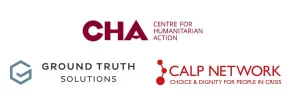Webinar: Digital Accountability in Cash and Voucher Assistance
The humanitarian system has been undergoing a digital transformation, predominantly driven by the desire to make the sector more efficient, effective, and accountable. Despite aspirations to strengthen people’s informed decision-making in humanitarian action, affected people are rarely involved in discussions on technology-related choices. And for those most vulnerable with low digital literacy levels, such conversations might even seem entirely out of reach.
At the same time, the recently updated IASC Operational Guidance highlights the need for responsibly managing people’s personal and non-personal data in a safe, ethical, and effective way. The Guidance focuses on ‘doing no digital harm’ while maximising the benefits of data and striving for collective action across the humanitarian system.
However, before replicating offline issues in an online environment, it’s time to start getting the basics right! Join us for our next discussion about digital accountability and where you will learn from daily realities. We will explore the questions:
- How should people affected by crisis meaningfully understand the use of their data in a way that allows them to hold organisations to account?
- In what ways can technology help the sector be more accountable, and what risks does this entail?
- How can or should we speak of technology and accountability when, in some parts of the world, the vast majority of people affected by crisis remain offline while, in other parts, affected people request to be virtually connected?
When: 12 July 2023 at 1:00 PM (CEST)/ 11:00 AM (UTC).

This webinar is hosted by Centre for Humanitarian Action (CHA) in cooperation with Ground Truth Solutions and CALP Network.
Image: Representative of PLAN International registers a woman during a verification process in Maiduguri Nigeria on 2nd August 2021. The World Food Programme continues to assist internally displaced people in northeast Nigeria with food packages and cash distribution in order to prevent famine. ©WFP/Arete/Bernard Kalu.



